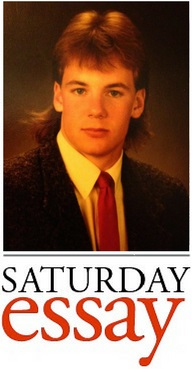Bad Student
‘Cause I survived the ’80s one time already
And I don’t recall it all that fondly
— Craig Finn
The bemulleted boy in that senior portrait over there came very close to not graduating with his Rochester John Marshall high school class of 1989 mates. One semester more and the rage that had fueled his self-destructive approach to school since 1983 would have elicited an anticlimactic letter explaining why he couldn’t walk in the ceremony and what he’d have to do if he wanted a diploma.
His K-6 career had suggested potential. Then a few months into seventh grade his interest in caring or trying seemed to evaporate. He embodied adolescent apathy. He also transcended it in ways that made very little sense to himself or anyone else. One example: he so bitterly resented being placed into advanced science and English classes (for reasons he could articulate no further than, “I just want to be in the normal classes”), that he intentionally got crummy grades on assignments until people who made such decisions had no choice but to bust him down to non-advanced sections.
At least that’s how I think I remember it. I know he was pissed — furious — about school in general, and still pretty far away from having vocabulary or perspective required to process what he was feeling or why. I know he self-sabotaged, sometimes so willingly it seemed wanton, and sometimes while watching it happen and wishing he knew how to stop it. In those situations, the latter often presented as the former. I also know it’s possible he got kicked out of those advanced sections because he just wasn’t equipped to stay in them. It’s not taking shots at him to say he might just not have been smart enough in ways the classes required students to be.










